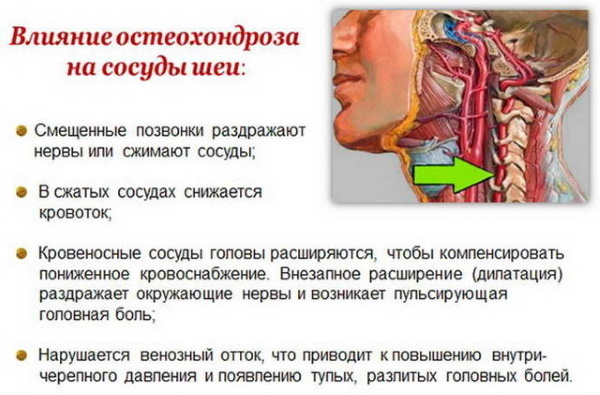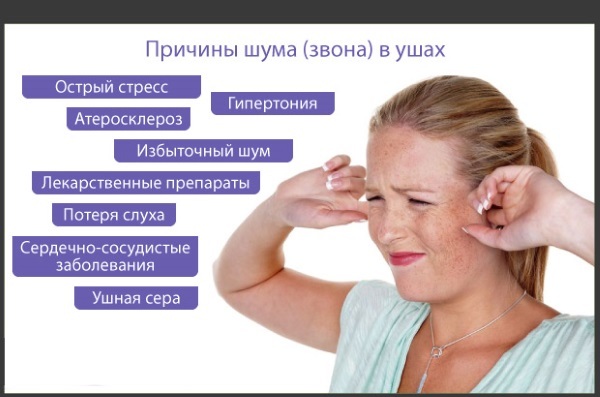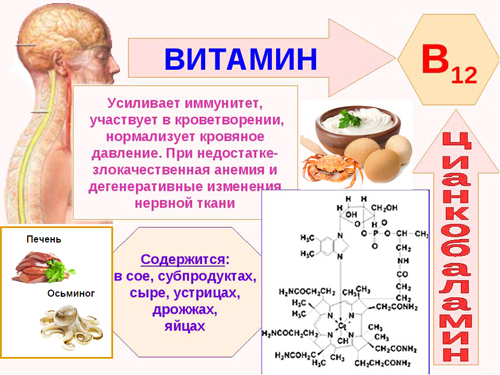Content
- Possible reasons
- Osteoarthritis
- Radiculopathy
- High blood pressure
- Inner ear muscle spasms
- Thyroid
- Sinus infections
- Ototoxic drugs
- Blockage of the ear canal
- Somatosensory tinnitus
- Treatment methods
- Drug treatment
- Unconventional treatments
- Possible consequences and complications
- Tinnitus Videos
Noise in the ear call the subjective perception of sounds in the absence of external stimuli. The intensity of the sounds can be different, low or high. Ringing or buzzing may come, go, or be present constantly in the right, left, or both ears. Many suffer from this so severely that they cannot lead a normal life. In medical practice, there are objective and subjective causes of the disorder.
Possible reasons
The ear canal is lined with tiny hairs (cilia of receptor cells) that sense movement and vibration, which are transmitted to the brain as sound. When stimulated, regardless of the cause, these cilia transmit sound signals. Side sounds in the ear occur when cells that respond to sound waves do not function properly. They begin to transmit electrical impulses that the brain misinterprets as sound.
Noise in the right ear (the reasons for its appearance are identical to the appearance of noise in the left), is often defined as idiopathic, having no source of the underlying disease. If etiological factors come into play, then the side noise can be caused by various reasons.
In the outer ear:
- accumulation of earwax:
- the appearance of a foreign object in the ear;
- allergies;
- anemia.
An extraneous sound appears in the case of pathologies of the middle ear:
- tumor development;
- penetration of infection;
- otosclerosis.
Inner ear diseases also cause unpleasant noises:
- Meniere's disease (swelling of part of the ear canal causing dizziness);
- swelling on the auditory nerve;
- labyrinthitis;
- complications after the flu.
Various systemic diseases can cause tinnitus:
- stenosis of the carotid arteries or jugular veins;
- diabetes;
- vascular atherosclerosis;
- high blood pressure or hypertension;
- osteochondrosis;
- the development of tumors, both benign and malignant.
Noise in the right ear, often the same as noise in the left ear, is a disorder called tinnitus. Most people experience subjective tinnitus, in which only the patient hears sounds. The prevalence of the disease in adults ranges from 10 to 15%, more often in older people. Objective tinnitus can be heard by the doctor when examining the auricle. This is a rare form of the disorder, occurring in less than 1% of cases.
Osteoarthritis
Disrupted blood flow through the vertebral arteries is a common cause of tinnitus. It is caused by cervical osteochondrosis, in which the vertebral artery spasms. Since the inner ear is supplied with blood by a branch of this artery, its disturbances lead to instability of blood flow, which is manifested by internal noise.

In such cases, the doctor prescribes:
- MRI of the brain of the area where the inner ear is located, because sometimes you can see a tumor of the auditory nerve, or a brain tumor.
- Duplex scanning of cervical vessels.
Radiculopathy
A pinched nerve, called radiculopathy, occurs when too much pressure is applied to one or more nerves in the body. Pressure can come from the muscles, cartilage, tendons, or bones that surround the nerve, disrupting its normal function. Pinched nerves is one of the conditions that can cause tinnitus.
The human cervical spine is divided into 2 parts; the upper part consists of the first, second vertebra, which connect the spine to the skull, and the lower part contains vertebrae 3 to 7. Anomalies of the cervical spine, especially the upper part, may affect the arteries and nerves associated with the ear.
For example, rheumatoid arthritis often causes tinnitus and, in some cases, hearing loss. In addition to the fact that rheumatoid arthritis affects tiny bones, cartilage, and joints in the ear, research has also have shown that hearing loss in patients with arthritis may be associated with immune system attacks on joints and fabrics.
Noise is common in people with autoimmune forms of arthritis. Prolonged or short-term pinching of a nerve affects ear function. In most cases, tinnitus is a side effect of a health condition that causes a pinched nerve.
High blood pressure
The noise in the right or left ear can be pulsating, hissing, which indicates a violation of blood circulation in the vessels. The cause may be hypertension and factors that increase blood pressure: stress, alcohol, caffeine.
There are other risk factors affecting blood pressure that cause tinnitus:
- atherosclerosis;
- turbulent blood flow;
- malformations of capillaries;
- tumors of the head and neck.
Inner ear muscle spasms
Tightening the muscles in the inner ear leads to noise, hearing loss, and a feeling of congestion. Sometimes it happens for an unexplained reason, but more often it is caused by neurological conditions, including multiple sclerosis.
Thyroid
The endocrine structure controls the process of burning energy by the body, the production of protein, the degree of sensitivity of the body to other hormones. Consequently, dysfunction of the gland, in which an insufficient amount of the hormone thyroxine is produced, causes many complications of other organs.
 These can include decreased energy levels, increased sensitivity to pain, weight gain, and depression. Thyroxine is essential for the normal development of the auditory system. Tinnitus is a very common effect of thyroid dysfunction. The condition becomes more pronounced in the presence of hypothyroidism.
These can include decreased energy levels, increased sensitivity to pain, weight gain, and depression. Thyroxine is essential for the normal development of the auditory system. Tinnitus is a very common effect of thyroid dysfunction. The condition becomes more pronounced in the presence of hypothyroidism.
Sinus infections
The ear has 3 parts: outer, middle and inner. From the eardrum comes a tube called the Eustachian tube, inside of which there is a small amount of mucus. The drainage of mucus, for example from the nose, can cause more fluid to accumulate in this compartment. This is facilitated by a number of viruses that lead to sinus infections or sinusitis.
Most of the ear problems associated with sinusitis, including tinnitus, are caused by nasal congestion that occurs during a sinus infection. Sinusitis most commonly occurs when a virus or bacteria irritates the tissue in your sinuses. This irritation can lead to swelling, which in turn leads to a build-up of mucus.
Sinus cavities and ears are interconnected systems, so sinus congestion can also cause ear congestion. This blocks the Eustachian tube, which connects the middle ear to the outer ear and helps regulate intra-ear pressure. When the Eustachian tube is blocked, pressure builds up around the eardrum, eventually causing ringing in the ears.
Ototoxic drugs
Tinnitus often occurs as a side effect of many medications. However, in most cases, tinnitus is an acute and short-term side effect. If the person stops taking the medication, the symptoms usually go away. However, there are some ototoxic drugs that cause more persistent symptoms.
These include:
- Antibiotics (Erythromycin, Neomycin).
- Cancer medications (Methotrexate).
- Non-steroidal anti-inflammatory drugs.
- Diuretics.
- Quinine-based medicines used for anemia.

Herbal supplements containing caffeine and nicotine also affect hearing quality and the development of noise.
Blockage of the ear canal
Obstruction in the middle ear can cause pressure to build up in the inner ear, which affects the function of the eardrum. In addition, objects in direct contact with the eardrum can irritate the organ and increase noise.
Common barriers include:
- Excessive amounts of earwax
- growing hair from the ear canal;
- dirt or foreign objects.
In many cases, clearing the blockage relieves symptoms. However, in some situations, the blockage causes irreversible damage that leads to chronic murmur.
Somatosensory tinnitus
Noise in the right ear, the causes of which, unlike real noise, are of a subjective nature, sometimes arise due to sounds made by the patient's own body. Unpleasant rhythmic sensations can also appear in the left ear. These noises are called somatosensory tinnitus.
It is a subtype of subjective tinnitus caused by sensory information transmitted from the cervical spine or jaw to the brain. A complex network of sensory neurons responds to movement, pressure, temperature, and pain. When changes, such as muscle spasms, occur in the cervical or temporomandibular region, tinnitus may occur.
Sensory information enters the brain through nerve fibers in the dorsal root ganglia or trigeminal ganglia. Since some of these fibers are projected onto the auditory system, the signals trick the brain into thinking it is hearing sounds.
Causes:
- Dysfunction of the neck. Prolonged tension in the neck muscles while sleeping on an uncomfortable pillow, if the body is tilted incorrectly over the computer keyboard, can lead to tinnitus.
- Neck injury leads to damage to the muscles, ligaments and nerves of the neck, cause pinching of the nerve. Trauma can be a trigger for the occurrence of somatic tinnitus.
- Dysfunction of the temporomandibular joint. This is where the lower jaw connects to the skull, is adjacent to the auditory system, and shares common ligaments and neural connections with the structures of the middle ear. Damage to muscles, ligaments, or cartilage can cause noise symptoms. Tinnitus patients will experience pain in the face or jaw, limited jaw movement, and regular popping sounds when chewing or talking. Dentist, craniofacial surgeon will help diagnose and fix problems.
Treatment methods
Noise in the right ear, the causes of which rarely differ from the causes of noise in the left ear, is not a disease. More often than not, tinnitus is defined by doctors as a combination of mental, emotional, and social problems.
If the tinnitus comes on suddenly and passes quickly, don't worry. Also, sometimes you need to change your lifestyle. If tinnitus appears as a sign of an underlying disease, the doctor examines not only hearing, but also the patency of the vertebral arteries, cerebral vessels, and blood sugar levels.
Drug treatment
Medicines cannot eliminate tinnitus, but they can reduce the severity of symptoms and prevent complications from developing.
| Tricyclic antidepressants | Amitriptyline. Nortriptyline Alprazolam |
Only used for severe ringing in the ears as they can cause unpleasant side effects including dry mouth, blurred vision, constipation and heart problems.
|
| Drugs that dilate the blood vessels of the brain | Novigan Nifedipine Vasolite Trenpental |
Expands blood vessels, allowing blood to flow through them more easily. Some act directly on the smooth muscle cells lining the blood vessels. |
| Antidepressants | Clopazepam Diazepam |
The drugs do not affect the elimination of noise, but change the emotional color, relieve symptoms. |
Removing the earwax can help reduce the symptoms of noise. In the treatment of major vascular diseases, surgical intervention is possible. Tinnitus associated with sinusitis usually goes away after a sinus infection is treated.
Since tinnitus is a symptom of a wide variety of diseases or, in many cases, cannot be found explanation for tinnitus (idiopathic tinnitus), there is no such thing as ears ". Comorbidities such as depression or anxiety disorders are treated individually.
Unconventional treatments
Some alternative treatments for tinnitus include acupuncture, hypnosis.
Additives used:
- Ginkgo biloba. A plant that stimulates blood circulation is effective for people with tinnitus.
- Melatonin. The drug has been proposed for the treatment of tinnitus due to its effects on sleep and its vasoactive (antioxidant) properties.
- Zinc. The trace element is involved in the transmission of nerve impulses along the auditory pathways in the body.
-
B vitamins. The drugs are an important component in the formation of the meninges, which surrounds and protects the nerves. A deficiency in vitamin B12 makes the nerves more vulnerable to damage caused by inflammation, which in turn can cause tinnitus.

Other methods are also used:
- Neuromodulation using transcranial magnetic stimulation. This means modulating or normalizing neural activity. TMS therapy delivers electromagnetic pulses to the brain, usually the prefrontal cortex. Recent research has shown that this form of treatment is beneficial for patients with tinnitus.
- Noise therapy. Sound therapy, sometimes called acoustic therapy, can help reduce tinnitus-related ringing or buzzing in your ears. It will not cure the disease, but it can make life easier. The patient is presented with white noise for several hours during the day, listening to which the person is distracted from his own noise. The theory is that tinnitus may be caused by over-activity in certain areas of the brain. In this way, background noise helps to change the patterns that cause brain activity.
- Relaxation techniques. Many people with tinnitus report that tinnitus gets louder and annoying when they are under stress. To more confidently cope with various loads, it is helpful to learn relaxation techniques such as autogenous training, Jacobson progressive muscle relaxation, yoga, qigong, or tai chi.
When there is a lot of noise, psychotherapy can be helpful to deal with anxiety or depression that contribute to the side sounds.
If tinnitus cannot be successfully treated with the above methods and hearing loss has exceeded a certain level, victims should have a hearing aid fitted early.
Possible consequences and complications
If untreated, extraneous sounds interfere with and potentially reduce quality of life. Constant noise disrupts sleep and work, and causes excessive stress, anxiety and depression. In addition, tinnitus is sometimes a symptom of a serious condition, such as a head injury or brain tumor, which can lead to life-threatening consequences.
One of the major problems with tinnitus is that the condition can mask a person's hearing loss.
Other health problems arise along the way:
- depression;
- increased stress levels;
- sleep problems;
- memory impairment;
- difficulty concentrating.
A person with tinnitus should not assume that they necessarily have one of the conditions listed above. However, noise in the right or left ear should be viewed as a warning that some damage to the internal structure of the auditory organ has occurred. Only a qualified physician can correctly diagnose the underlying cause and prescribe appropriate treatment.
Tinnitus Videos
Simple home treatment for tinnitus:
